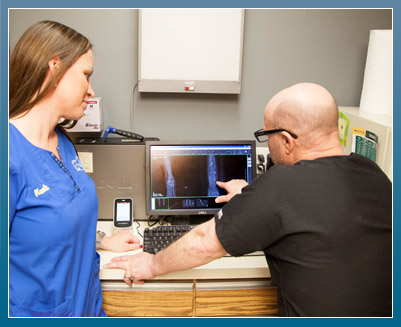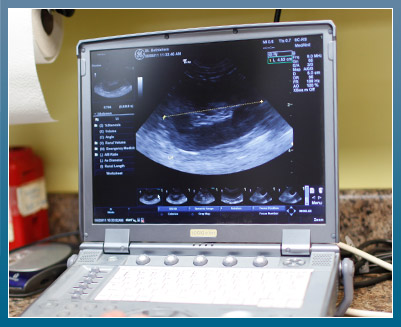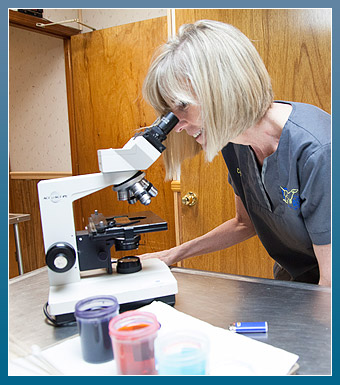Diagnostic Services
 Digital Radiographs
Digital Radiographs
Radiographs, or X-rays, are one of the most common, useful diagnostic tools in medicine. After performing a thorough examination, diagnostic tests are sometimes necessary to identify the underlying cause of your companion's illness.
The veterinarians at the Animal Hospital of Sayreville use X-rays to examine your pet's bones, lungs, heart, abdomen, oral cavity and other areas, and for diagnosing and monitoring many medical and surgical conditions. If we suspect your pet has a fractured bone, has swallowed a foreign object, or is suffering from a heart problem, an X-ray can tell us what we need to know. In addition, we perform many specialty procedures, including GI series and urinary bladder contrast studies. These special procedures are necessary for identifying difficult or chronic problems.
As part of our commitment to provide you with the best medical care for your pet, the Animal Hospital of Sayreville has invested in a state-of-the-art digital X-ray machine. There are important advantages to digital X-rays for you, your pet, our team and the environment:
- They can be immediately viewed on a computer monitor.
- The clear, detailed images can be manipulated to get a better view of your pet's bones and internal organs, leading to a faster, more accurate diagnosis.
- They take less time to process, which means less time for your pet on the X-ray table (and less stress), and less waiting time for you.
- No harsh chemicals are needed to develop the images, reducing potential harm to our team and the environment.
- If a second opinion is necessary, digital X-rays can be sent by email to a specialist.
Advanced diagnostic capabilities are an extremely important part of veterinary medicine, in part because we can't simply ask our patients what's wrong. Our investment in digital X-ray technology reflects our commitment to offer your pet the best, most comprehensive healthcare available.
 Ultrasound
Ultrasound
Ultrasound is a painless, safe, non-invasive procedure we use to evaluate your pet's internal organs. It's one of many ways we strive to give you peace of mind when it comes to your pet's health. Using sound waves, ultrasound produces a real-time moving picture of your pet's organs that allows us to visualize objects that cannot be detected by X-rays alone.
The skilled veterinary team at the Animal Hospital of Sayreville uses ultrasound to assess the shape, size, tissue density, internal structure, and position of your pet's abdominal organs; assess cardiac health (also called an echocardiogram); identify masses or tumors; and as a guide during surgical biopsies.
The ultrasound procedure takes between 30 to 60 minutes to perform and, unless it is being used during a surgical biopsy, does not typically require sedation. A diagnosis based on what we see is usually available immediately, which means we can also provide you with treatment options at the time of your appointment, minimizing your worry and stress.
Blood Pressure Monitoring
High blood pressure, also known as hypertension, is far more common in pets than many people realize and can cause serious illnesses such as renal disease, heart disease, diabetes, hypothyroidism, and more.
For these reasons, the veterinarians at the Animal Hospital of Sayreville recommend regular blood pressure screenings for your pet during wellness checkups. Regular screens allow us to determine your pet’s baseline blood pressure and check for hypertension. Signs of hypertension include:
- Depression
- Behavioral changes
- Sudden blindness
- Symptoms related to underlying diseases that can cause high blood pressure, such as endocrine and kidney diseases.
After your pet's blood pressure has been measured, we will explain the results and provide a recommendation if necessary. We will also discuss the signs and symptoms of hypertension and home care strategies to prevent your pet from experiencing this dangerous condition.
 In-House Medical And Diagnostic Laboratory
In-House Medical And Diagnostic Laboratory
When performing routine wellness examinations or diagnosing an illness, what our veterinarians can't see is as important – if not more important – than what they can. For that reason, we have a complete in-house diagnostic laboratory that allows us to perform a wide range of tests on blood, urine, feces and biopsied tissue. Laboratory testing can provide information about your pet's overall systemic health, as well as detect diseases and other conditions affecting your pet's health and well-being without the need for invasive and expensive procedures.
For example, diagnostic testing can detect Heartworm disease, Lyme disease, infections, Feline Leukemia, intestinal parasites, urinary tract infections and many other diseases and conditions that can go unnoticed in their early stages. Blood testing can show early evidence of diabetes, changes in liver or kidney function or simply provide a baseline for future reference. Diagnostic laboratory testing is also completed prior to dental or surgical procedures that require general anesthesia.
Our extensive laboratory services provide diagnostic information that is critical to your sick or injured pet. With our in-house blood analyzer, we can get laboratory test results in as little as 20 minutes. Having test results this quickly allows us to begin your pet’s treatment almost immediately.
